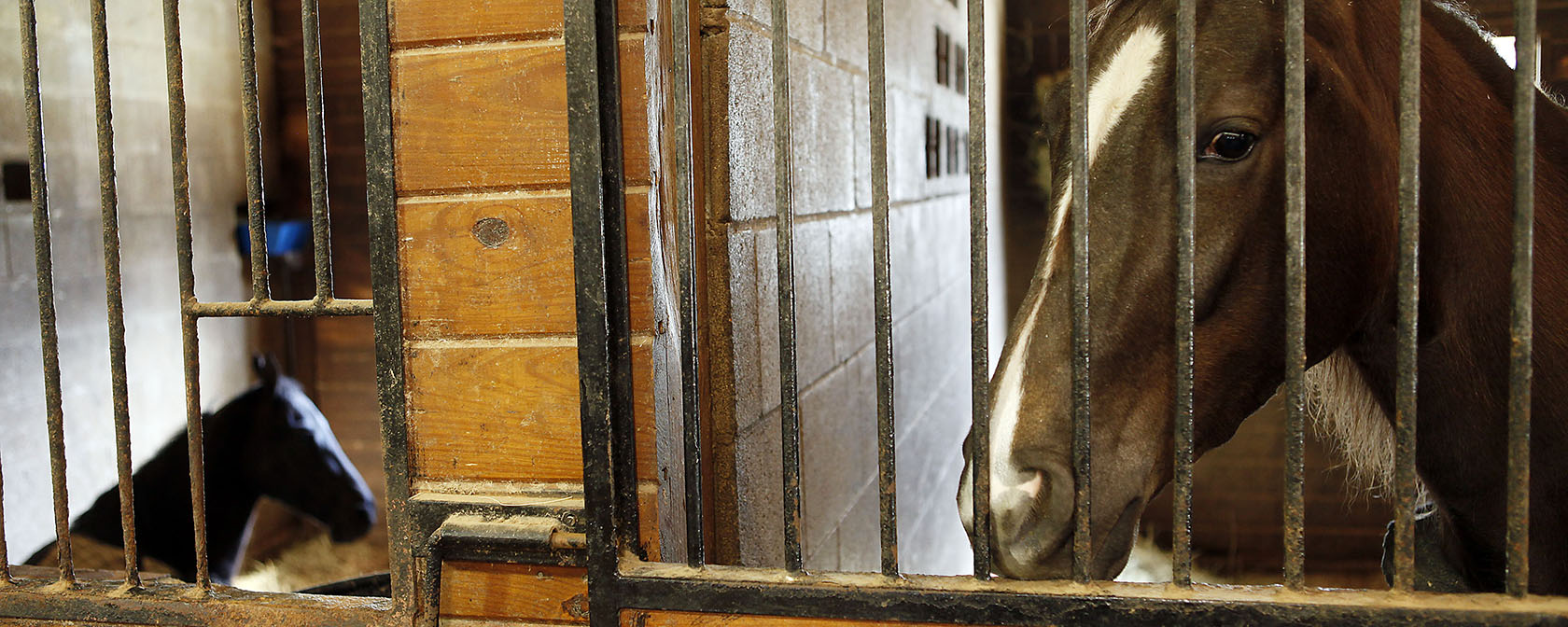By Sara Amundson and Kitty Block
There’s new hope for ending the painful practice of horse soring: a long-awaited new administrative rule from the U.S. Department of Agriculture, one that’s badly needed and long overdue.
Horse soring is an undeniably cruel practice in which trainers covertly and deliberately torment show horses by slathering their limbs in caustic chemicals and wrapping them with plastic wrap to “cook” into the horse’s flesh. In training and competitions, trainers force the horses to wear heavy, binding, high-heel-like shoes, and metal chains that knock repeatedly against their sored ankles. Some even cut the hooves down to the delicate tissue and jam in hard or sharp objects. All this abuse is inflicted to produce the “Big Lick,” an exaggerated, high-stepping gait rewarded by judges in the show circuits of Tennessee Walking Horses and related breeds.
Protect horses from soring >>
The Horse Protection Act, originally passed in 1970, was intended to end soring. However, for decades, the USDA’s regulations have enabled the industry to train its own inspectors to examine horses for soring at shows and sales. This self-policing system is rife with conflicts of interest, and industry insiders have allowed soring to persist and even to flourish. Data made available to the public by the USDA revealed that in events from 2018-2020 covered by industry inspectors and USDA inspectors, the USDA inspectors found violations at a 403% rate higher than industry inspectors—illustrating that industry inspectors turned a blind eye to soring.
In response to a 2010 audit report by the USDA’s own Inspector General that called this scheme a failure and said it should be abolished, the agency pledged to replace industry self-policing with a team of USDA-licensed and trained inspectors and announced final regulations to do so in 2017. The final regulations received more than 100,000 supportive public comments, including bipartisan letters signed by 182 representatives and 42 senators. Unfortunately, these regulations were withdrawn soon after by a new administration. We sued the USDA for this action, arguing that the agency failed to undertake the proper procedures for withdrawing a rule that had been finalized. The federal Court of Appeals for the D.C. Circuit agreed with us, meaning that the USDA must take action to fix its error.
Thankfully, the USDA is again proposing to amend its HPA regulations by eliminating the industry-run enforcement system, and instead assigning sole responsibility to its Animal and Plant Health Inspection Service to screen, train and authorize inspectors. The agency also proposes to disallow the use of devices and substances that are integral to soring, and to make other needed reforms. By taking this step, the Biden administration would reaffirm the federal government’s commitment to preventing the cruel practice of horse soring.
Ending horse soring is broadly supported by Congress. The Prevent All Soring Tactics (PAST) Act would codify key elements of the 2017 HPA rule, including eliminating the failed industry self-policing system and use of devices integral to soring. The legislation has twice been passed by an overwhelming bipartisan majority in the House and has been consistently co-sponsored by a majority of the Senate going back to 2014. Since the USDA itself could accomplish much of what the PAST Act aims to achieve, Congress has also expressed support for upgraded regulations, through appropriations language calling for the swift proposal, finalization and publication of the new final rule.
We are thrilled that a new HPA rule is on the horizon and pleased to see provisions of the 2017 rule included in the proposed rule. Specifically, this includes the prohibition of the use of action devices on any Tennessee walking or racking horse, and an end to the industry self-policing system. We hope the final rule expands the prohibition on action devices to include weighted shoes for Tennessee walking and racking horses of all ages and expands the ban on the use of all prohibited devices to include Spotted Saddle Horses, who are also victims of soring.
Soring should have ended in this country over half a century ago. A tougher, unbiased enforcement system and prohibition on soring instruments is imperative to finally protect horses from soring. Agriculture Secretary Tom Vilsack was in charge of the USDA when the 2017 rule was finalized, and he can get the job done now. We hope you will join us in urging the USDA to bring these long-overdue reforms swiftly over the finish line.
Kitty Block is CEO of the Humane Society of the United States.
